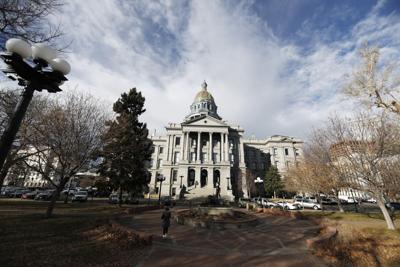Ever since TABOR (the Taxpayer’s Bill of Rights) was enacted in 1992, our courts and legislature have been ignoring the large animal in the room. Namely, the difference between a “tax” and a “fee.” Some things seem logical. Such as a “drivers’ license fee” versus a “property tax.” This seems logical until someone wants to call the property tax a “homeowner’s fee.” Should that occur, the cost of owning a home could skyrocket completely against the intent of the TABOR law.
Category Archives: Media
Best And Worst Policy Developments Of 2019
Best And Worst Policy Developments Of 2019
Source: AP Photo/Evan Vucci
TABOR wins in Colorado – Without question, the best fiscal system for a jurisdiction is a spending cap that fulfills my Golden Rule. Colorado’s constitution has such a policy, known as TABOR (the Taxpayer Bill of Rights). Pro-spending lobbies put an initiative on the ballot to eviscerate the provision, but voters wisely rejected the measure this past November by a nearly 10-point margin.
SLOAN | To tone-deaf tax hikers, ‘no’ translates to try, try again
 This year’s defeat of Proposition CC was a bitter experience for the state’s Democrats and liberal groups, but apparently not a didactic one, at least for the latter. Proposals are already in the works for some new iterations of the ubiquitous tax-increase ballot measures which crop up every second election or so, just to see if perseverance will ultimately win out over fiscal literacy.
This year’s defeat of Proposition CC was a bitter experience for the state’s Democrats and liberal groups, but apparently not a didactic one, at least for the latter. Proposals are already in the works for some new iterations of the ubiquitous tax-increase ballot measures which crop up every second election or so, just to see if perseverance will ultimately win out over fiscal literacy.
Most of the proposals are conjured up by groups like the leftist Colorado Fiscal Institute, which houses some presumably very bright people whose economic analysis nevertheless boils down invariably to tugging on the General Assembly’s sleeve and pointing at someone else’s wallet.
Carol Hedges, executive director of CFI, said in an interview in some other publication that “what I took away from Prop. CC was that was not the solution.” Clearly. She goes on to say “that solution didn’t address the concerns of folks who voted in the election, and we have an obligation to solve those problems.”
What problems are those, exactly?
Income tax rates decreasing in Colorado in 2020 as TABOR Refunds kick in
DENVER — It’s official. Coloradans will be giving less to Colorado state government in 2020.
Governor Polis made the announcement official in an oped this morning with The Colorado Sun.
Income tax rates will be decreasing from a flat 4.63% to 4.5%.
The decrease was mandated by the Colorado State Constitution and the Taxpayer Bills of Rights (TABOR) which limits how much government can grow each year.
Passed in 1992, this is the first year TABOR has triggered cuts. As opposed to sending checks to taxpayers, income tax rates will be cut instead.
TABOR 2019 State of Colorado Taxation Division Website
TABOR 2019
For the first time, TABOR triggers an income tax rate cut. Here’s how much you can save on 2019 taxes.
Colorado will temporarily lower the income tax rate to 4.5% — a move Gov. Jared Polis is celebrating despite concerns from his party
Any TABOR measure needs to say what it is
Any TABOR measure needs to say what it is
If we asked readers to give us their honest feedback about Article X, Section 20 of the Colorado Constitution, we doubt we’d get any. Who, besides lawmakers or legislative staff, could even hazard a guess as to what issue that part of the Constitution addresses?
But if we asked readers to give us their honest feedback about the Taxpayer’s Bill of Rights, that’s a different story. Even if you didn’t have a firm position on whether it affects the state’s ability to deliver government services, you’d at least be familiar with the general subject matter.
Group restarts tax fight, files 35 ideas for Colorado ballot
Ballot proposals would move the state back toward a graduated tax
If the fight over Colorado tax policy were a sporting event, half the stadium would be empty.
With the November defeat of Proposition CC, fiscal conservatives have taken the field, and a contest over the Taxpayer’s Bill of Rights feels like a foregone conclusion.
But to Democrats and aligned interest groups, policy losses such as tax hikes for schools, roads and higher education just mean they haven’t found the right game plan.
“What I took away from Prop CC was that was not the solution,” said Carol Hedges of the Colorado Fiscal Institute, a liberal tax policy group. “That solution didn’t address the concerns of the folks who voted in that election, and we have an obligation to solve these problems.”
So a month after voters defeated the measure to eliminate the state’s spending cap, Hedges’ organization is playing offense and has introduced an eye-popping 35 tax-related ballot initiatives for 2020. The specifics vary proposal to proposal, but one theme unites them: creating a tax code that requires the wealthy to pay more to fund public services.
Slower economic growth, higher TABOR refunds projected in government forecasts

Two forecasts for Colorado’s economy cite continued growth in the state, but noted a tight labor market would cause that growth to be muted in the coming years.
The state legislature’s Joint Budget Committee has received forecasts from the Legislative Council Staff and the Office of State Planning and Budget.
The forecasts estimate that taxpayers will see refunds granted by the Taxpayer’s Bill of Rights (TABOR), as the state collects revenue above the state spending cap.
In a statement, House Democrats said the spending caps “limit the state’s ability to invest in critical priorities, such as education and transportation.”
The Legislative Council staff forecast said the state can expect to see economic activity expand as job growth and rising wages continue.
The tax fight continues in Colorado as liberal group files 35 more ideas for the 2020 ballot

Voters cast their ballots at downtown Denver’s Bannock Street polling location on Election Day, Nov. 5, 2019. (Jesse Paul, The Colorado Sun)



